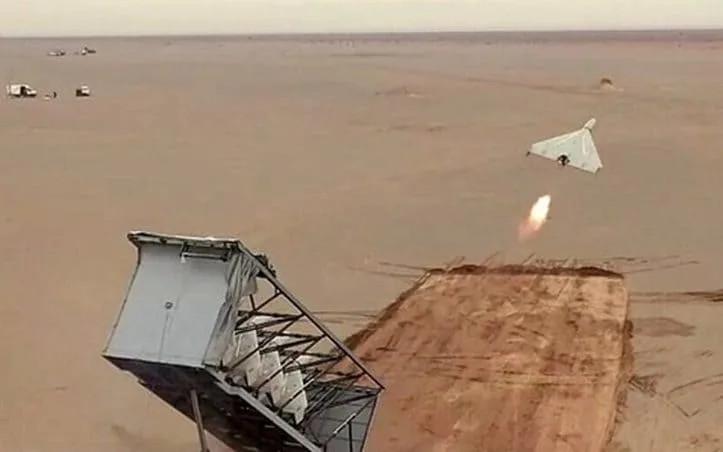
Iran’s rapidly expanding top secret drone factory where Hezbollah is trained
Iran is training Hezbollah fighters to carry out drone attacks on northern Israel at a rapidly-expanding top secret base, The Telegraph can reveal.
The drone facility in Iran has tripled in size since it was set up in 2006, in spite of US sanctions, according to leaked classified Islamic Revolutionary Guard Corps (IRGC) documents.
Located just five miles from Iran’s holy city of Qom, the centre, under the command of the supreme leader, Ali Khamenei, has expanded from a runway of 500 metres to 1,500 metres today.
Intelligence reveals the country’s dictator ordered the concentration, strengthening and rapid development of unmanned aerial vehicle (UAV) manufacturing activities by the regime’s main drone manufacturer, Qods Aviation Industry Company in 2004.
In spite of being on the US Treasury sanctions list since Dec 12 2013, the drone HQ which belongs to Qods, has continued to expand.
Once a small airport for small crop-spraying planes, it has gone from a runway of 500 metres in 2007 to expanding to 1,000 metres in 2014 and, in 2020, to 1,500 metres, allowing for bigger, more long-range drones to take flight, such as those used in Iran’s aerial assault on Israel last month.A new hangar was added to the complex next to the runway in 2021.
The intelligence, compiled by the network of the People’s Mojahedin Organization of Iran (PMOI/MEK) inside the country from various sources including some inside the IRGC, reveals that the Gangine centre, which has remained secret until now, hosts leaders of the region’s terror groups currently wreaking havoc across the Middle East, most notably, Lebanese Hezbollah.
In addition to training and testing drones such as the long-range Mohajer, which can fly up to 1,000 miles over 24 hours, the centre also is a drone pilot training centre. According to reports from inside the regime, militants are trained in small groups of a handful of fighters.
Since the outbreak of the Gaza war on October 7 when Hamas militants invaded Israel, Iran’s proxy Hezbollah in Lebanon has launched a second offensive on the Jewish state.
More than 3,100 projectiles have been launched into Israeli territory, killing and wounding multiple soldiers and civilians in the worst conflict between the two countries since the Second Lebanon War. It has since led to the displacement of more than 100,000 Israelis who see no prospect of returning home amid the ongoing fighting.
According to information revealed by the hacking group Uprising Till Overthrow, the Ministry of Defense and Armed Forces Logistics has taken over 949 hectares (about 9.5 square kilometres) in the Ganjine region north of Qom for the establishment of this centre.
Hossein Abedini, deputy director of the National Council of Resistance of Iran’s UK office, said: “The developments in recent months have proven that the head of the snake, in terms of belligerence and the export of terror in the Middle East, is the clerical regime in Tehran.”
He was referring to Iran’s barrage of 350 plus drones and missiles sent towards Israel last month.
Test run for more threats to archenemy Israel
While most were intercepted by Israel and a US-led coalition, Iran remains adamant that it was merely a test run for more to come in threats to its archenemy, Israel.
Mr Abedini said that Iran’s warmongering abroad comes as a ploy to distract from unrest at home, triggered by the death in morality police custody of Mahsa Amini in 2022, arrested for allegedly breaching hijab rules.
Since the Russian invasion of Ukraine, Iran has been sanctioned for its provision of drones to Russia used on civilian targets. “Ali Khamenei, the regime’s leader, has been emboldened by appeasement and feels confident about the inaction of the international community and the absence of serious consequences for his regime’s malign activity,” Mr Abedini said.
“It is time to place the IRGC on the terrorist list. This is a necessary precursor to peace and tranquillity in the region and the world.”
Douglas Barrie, a senior fellow for military aerospace with the International Institute for Strategic Studies, said supplying drones to Hezbollah in Lebanon and the Houthis in Yemen, allows Iran to have a real-life centre to test design, functionality and accuracy of their missiles.
He added: “Exporting systems also allows Iran to see how their .,” he said, testing the likes of design,
“Tehran puts these capabilities in the hands of its network of regional actors so it can influence their behaviour and make considerable mischief for some of its regional rivals.”
Source » yahoo





